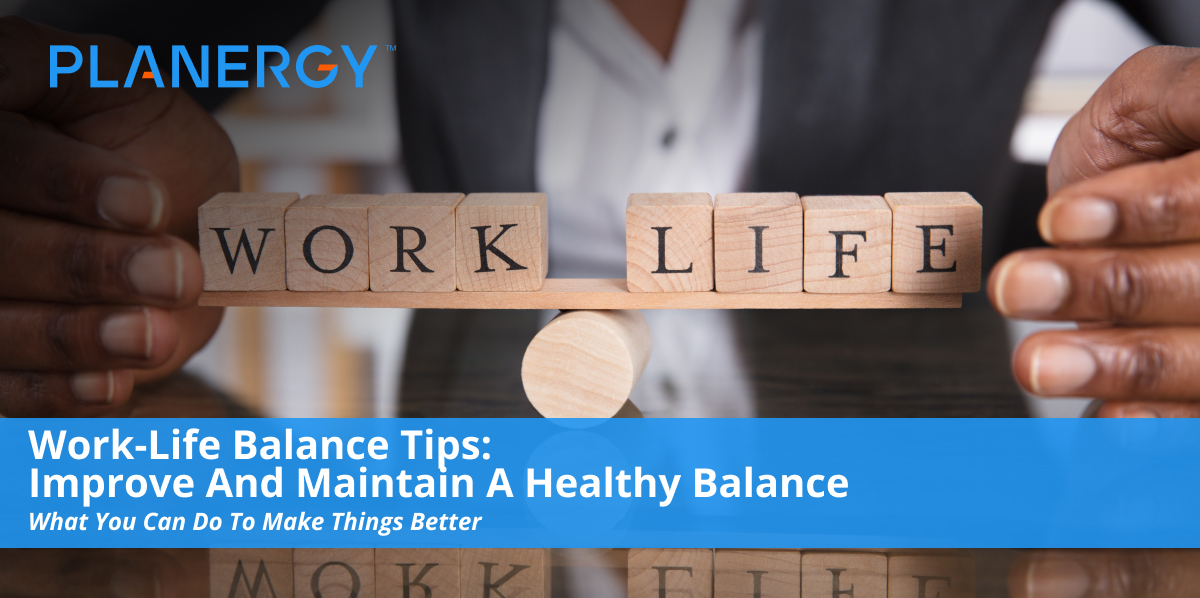As we continue to shape our new normal, many offices are opting to allow employees to keep working remotely instead of returning to the office.
And while that does allow for more flexibility, it can be difficult for employees to strike the right balance between work and home life.
Whether it’s because of working longer hours, more responsibilities at work, or more responsibilities at home, many things can lead to a poor work-life balance.
If at the end of the day, you’re always left wondering why you don’t have enough time to do the things you love, it might be time to spend less time at work and more time on self-care.
We’ve written about the importance of work-life balance before, but now, let’s look at some of the ways to make it happen.
Scrape the Idea of “Perfection”
As soon as you let go of the idea of a perfect work-life balance, you’ll be far better equipped to maintain a healthy one.
Instead of aiming for the perfect schedule, try to achieve a realistic one.
Some days, you may need to focus more on your work, other days it makes more sense to focus your effort and attention on your hobbies and spending time with your loved ones. Balance is achieved over time rather than each individual day.
Ideally, you should remain flexible and continuously assess where you are compared to your priorities in your goals.
There will be times when your children need you more in the short term, and there may be times when travel for work is required.
What matters is that you remain open to redirecting and assessing your needs on any given day. This is crucial to improve your work-life balance.
Work in a Job You Love
Finding a job you love is often easier said than done. Work is a normal part of society but that doesn’t mean it should be restraining. If you hate what you’re doing, you won’t be happy.
Well it’s true you don’t need to love each aspect of your job to be happy with it, it does need to be exciting enough to keep you from dreading getting out of bed every morning.
If you’re not sure what that job would be, think about the things that you are passionate about. What is something that you would do for free? that’s the kind of thing you need to be aiming to get paid to do.
If you find that your job is draining and you’re facing difficulties with doing the things you love outside of work, there’s something wrong.
You could be in a toxic environment, dealing with a toxic boss, or doing a job that you just don’t love. If any of these apply, it’s time to start looking for something else.
Make Your Health and Wellness a Priority
Your main priority should always be your physical, mental, and emotional health. If you’re struggling with anxiety or depression and think that therapy could be a good idea, make sure to fit those appointments into your schedule.
Do this even if it means you have to leave work early or skip your evening workout at the gym. If you are dealing with a chronic illness, don’t be afraid to call in sick on the tough days.
Overworking yourself leads to higher stress levels, which makes it harder for you to get better which causes you to take more days off in the future.
Making your health a priority will make you a better person and employee. You will Miss Westmark overall and when you’re there, you’ll be more productive and happier.
Prioritizing your health doesn’t have to mean engaging in an extreme or radical activity.
It can be something as simple as meditating daily or participating in an exercise you enjoy.
Make it a Point to Unplug
With the internet being so readily accessible from our handheld devices, it can be hard to disconnect and unplug. making it a point to unplug for a few minutes every day or every week gives us the time we need to recover from stress while also giving us space for thoughts and ideas.
Unplugging doesn’t have to mean completely turning off your phone for several hours after work. It could be something as small as practicing meditation during your daily commute instead of checking your work email.
Taking time to unwind is critical to your success and helps you to feel more energized when you are working.
Make Time for Yourself and Your Family
Yes, your job is important, but it doesn’t need to be your entire life. You were an individual before you took the position and you should make the activities and hobbies that make you happy a priority in your life.
Achieving work-life balance requires deliberate action. If you don’t adequately plan for your personal time and family time, you’ll never have a chance to do anything other than work.
No matter how hectic your schedule becomes, you are the one with ultimate control over your time and your life.
When planning time with your family members, create a calendar for dates. It may seem a little odd to plan one on one time with someone you share a home with, but it doesn’t show that you spend quality time with them without creating a work-life conflict.
Just because your work keeps you occupied doesn’t mean that you should neglect your personal relationships.
No matter how hard you work and how great you are at your job, no one will love you the way your loved ones do.
Everyone is replaceable at work no matter how important you think your job is. The company isn’t going to stop running because you take the day off tomorrow.
With the increase in telecommuting, it’s easier for our personal and professional lives to blur. Make it a point to focus on taking care of your needs.
Take a Vacation
Many jobs offer vacation time for a reason and you should use it. if you’re having trouble completely unplugging, that vacation will help you shut off work completely for a little while.
Whether it means taking a one-day staycation or taking a two-week trip to another country, it’s important to take time off to recharge, both physically and mentally.
A 2018 study found that a little over half of employees reported having unused vacation days at the end of the year.
It’s normal to worry about taking time off because you think it will disrupt your workflow and cause a backlog of work when you return. However, the spirit shouldn’t restrict you from taking the break you need.
Your time away from work as well deserved in the benefits of taking a day off far outweigh the downside.
With proper planning, you can take your time off without worrying about the burden you place on your colleague colleagues or dealing with a huge workload when you get back.
Set Boundaries (That Includes Work Hours!)
One of the best ways to avoid burnout is to set boundaries for yourself and your co-workers. When you leave the office, make an effort to stop thinking about upcoming projects.
Don’t answer company emails. If possible, use a separate computer or phone from work so that you can shut it down when you clock out.
If that isn’t possible, use separate email addresses, browsers, and filters for your work and personal platforms.
If possible, set specific work hours. Whether you work outside the home or at home, it is important to determine when you will start and stop work.
Otherwise, you might find yourself answering work-related emails late at night, during your weekends off, or during vacation.
Notify your team members and manager about the boundaries you set. Let them know that you won’t be accessible because you’re using the time for personal activities.
This helps to ensure they understand and respect your work limits and expectations.
Regardless of what boundaries you said, make it a point to honor the boundaries of others. Be intentional when you communicate. Only send the messages that you need to send. avoid sending messages to your co-workers outside of their standard working hours.
If you have to due to scheduling issues, don’t expect them to reply until it is inside their normal working hours again.
Stop Multi-Tasking
It’s a myth that multitasking makes us more productive. Our brains are much like computers and require a few minutes to reset between tasks.
The difference is that computers, most of the time, move so fast between tasks that we don’t register the computer taking a break as it switches from one task to another.
Breaking the multitasking habit is especially crucial when you work from home. Distractions like laundry, taking the dog for a walk, and running the dishwasher can pull us away from our work tasks and drastically decrease our productivity.
What this means is that we end up spending more time at work getting things done when we could have maximized our time by letting those home tasks wait until a break or until we were otherwise finished with our workday.
Set Goals and Prioritize
Take a few minutes to look at your to-do list, and cut out any tasks that have little to no value.
Pay attention to when you were most productive at work and use that time for your most important work-related activities.
Set realistic, achievable goals with time management strategies, such as the Pomodoro technique.
Try your best not to check your email or your phone every few minutes because these are major time-wasting tasks that derail your attention and plummet your productivity.
Structure your day in a way that allows you to be more productive at work so that you can have more free time to relax outside of it.
Create (and Stick to!) Morning and Evening Rituals
Having good rituals in the morning when you wake up and in the afternoon or evening when you finish work or especially important because they signal to our brain that it’s either time to ramp up for work or wind down from work.
Having these rituals and place is crucial for remote workers who don’t have the physical separation between work and home life.
Schedule a few moments of non-negotiable me-time every morning after you wake up to do something you love before you clock in for the day.
Without a clear evening ritual at the end of your day, you leave room for your work life to blend into your personal life. At the end of your workday, check your calendar for tomorrow so that you can start with a plan.
Turn off your computer and take a few moments to celebrate that you’ve just finished another day at work.
Flexible Workplaces Matter
Those who report maintaining a healthy work-life balance often highlight their flexible work schedule.
Recent studies have shown that over the past seven years, many employers have allowed their staff greater flexibility in terms of their schedule and where they work.
As employers continue to struggle with fewer resources for benefits, they have prioritized giving employees a wider range of benefits that fit individual and family needs which ultimately improves their health and well-being.
Employers who are flexible find that that flexibility has a great return on investment.
Employers who wish to remain competitive have to find ways to offer flexible work options if they want to be able to attract and retain top talent.
A good work-life balance will mean different things to different people because we all have different lives.
In the always-on world, balance is a highly personal thing and only you, the individual, can decide the lifestyle that is best for you.




